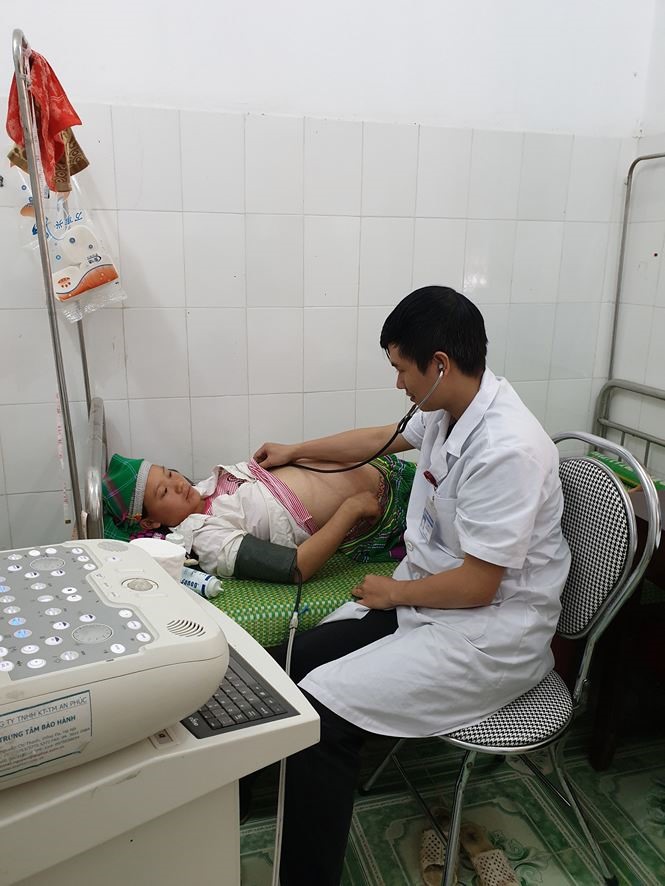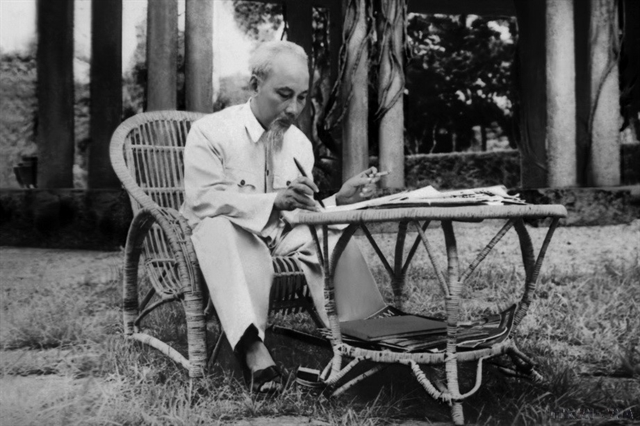 Society
Society

Dương Mạnh Huy learned about a project in which young doctors would volunteer to work in poor districts and on islands when he was a fourth-year student at the Hà Nội Medical University.
 |
| Huy examines a pregnant woman. The young doctor often has to fulfill different roles. — Photo tienphong.vn |
Nông Hồng Diệu
CAO BẰNG — Dương Mạnh Huy learned about a project in which young doctors would volunteer to work in poor districts and on islands when he was a fourth-year student at the Hà Nội Medical University.
Many of his classmates were hesitant about taking part in the project. They were afraid they would not be able to return to the city or their skills would suffer.
However, Huy jumped at the opportunity.
Finishing his studies at Hà Nội Medical University, Huy spent two years practicing medicine professionally before packing up and travelling to the northern mountainous province of Cao Bằng to work at the Bảo Lạc District General Hospital.
It was the first time Huy had been to Bảo Lạc District. He chose the district from a list of 62 impoverished districts at random.
Huy’s first impression was not good, as the area had recently been hit by a typhoon and the roads were treacherous. The journey took him 10 hours by bus.
“I was shocked. ‘Why is this place so far and hard to get to?’ I thought. The bus was shaking and I was sick. The passengers were scared of landslides,” Huy said.
But the young doctor was not discouraged.
“The distance is not important. The most important thing is how I do my work,” he said.
Huy has now worked in the remote district for more than a year.
Ups and downs
In 11 months in 2018, Huy took part in more than 300 surgeries at Bảo Lạc District General Hospital, of which he was the main surgeon for 179.
Huy was worried at first. When he studied in Hà Nội and performed surgeries, his teachers and other doctors were on hand. But in Bảo Lạc District, Huy had to work independently. He also had to specialise in other areas of medicine, such as paediatrics, internal medicine and infectious diseases.
Thanks to enthusiastic help from the hospital’s leaders and colleagues, Huy quickly gained confidence and adapted to his work.
Bảo Lạc District has a number of different ethnic minority groups, including Tày, Nùng, Dao, Mông and Lô Lô.
Due to limited knowledge and the hazardous terrain, local residents face difficulties in accessing healthcare. However, Huy tries to ensure every patient receives the best care.
Once Huy treated a patient who was herding cattle and was pulled over by one cow. He fell hard against a tree. The patient did not go to hospital immediately and only sought treatment when he was in severe pain.
After performing an ultrasound, Huy discovered that the man had internal bleeding and rushed him to the operating theatre.
The patient had a perforated spleen, injuries to his liver, and more than three litres of blood in his abdomen.
“I was shocked. If the patient had waited another day, he would be dead,” Huy said.
The surgery lasted for more than two hours.
“Surprisingly, he recovered quickly. He was discharged after just seven days,” he said.
Huy also has many memories from working with female patients.
At first, many women would not allow treatment from a young male doctor. Even pregnant women refused appointments with Huy and the doctor had to call the patients’ husbands to convince them.
However, there was one case that sticks with Huy.
One particular woman was pregnant with twins. As the due date approached, the woman stayed at home despite being in serious pain. When her family finally took her to hospital, Huy tried his best, but could only save one baby.
“If only she came to hospital earlier, we could have saved both of them,” said Huy.
Sympathy
Huy doesn’t regret his choice to go to the mountainous region.
“Coming here was the right decision, because I like what I do, and I am more devoted than when I was in the city,” Huy said.
Showing their appreciation, patients often give simple gifts, such as fruit from their gardens.
Huy will work in Bảo Lạc District until the end of January 2021.
“I like living here. Local people are friendly, the food is delicious and the air is pure,” he said.
“Patients here understand our hard work. They believe in doctors, and never complain,” he said. — VNS




